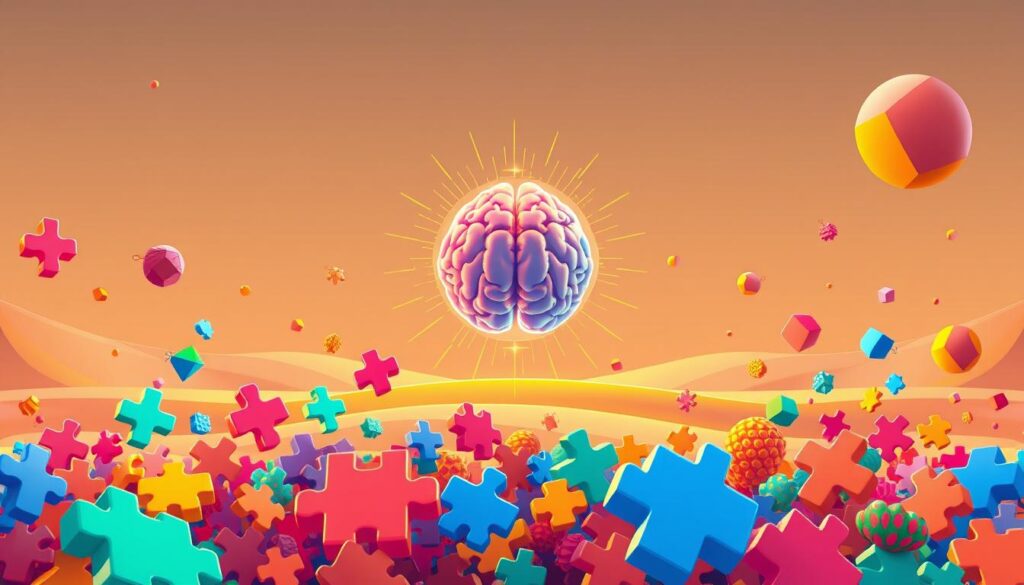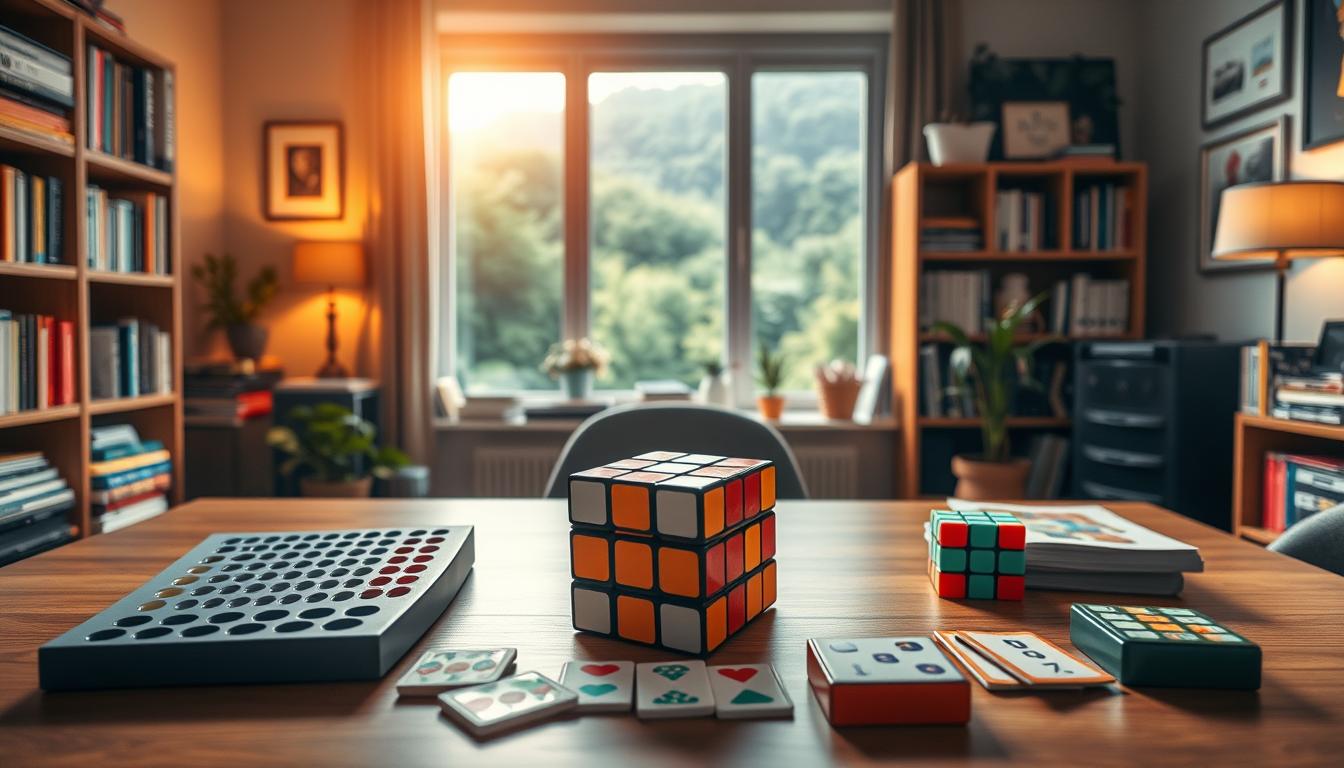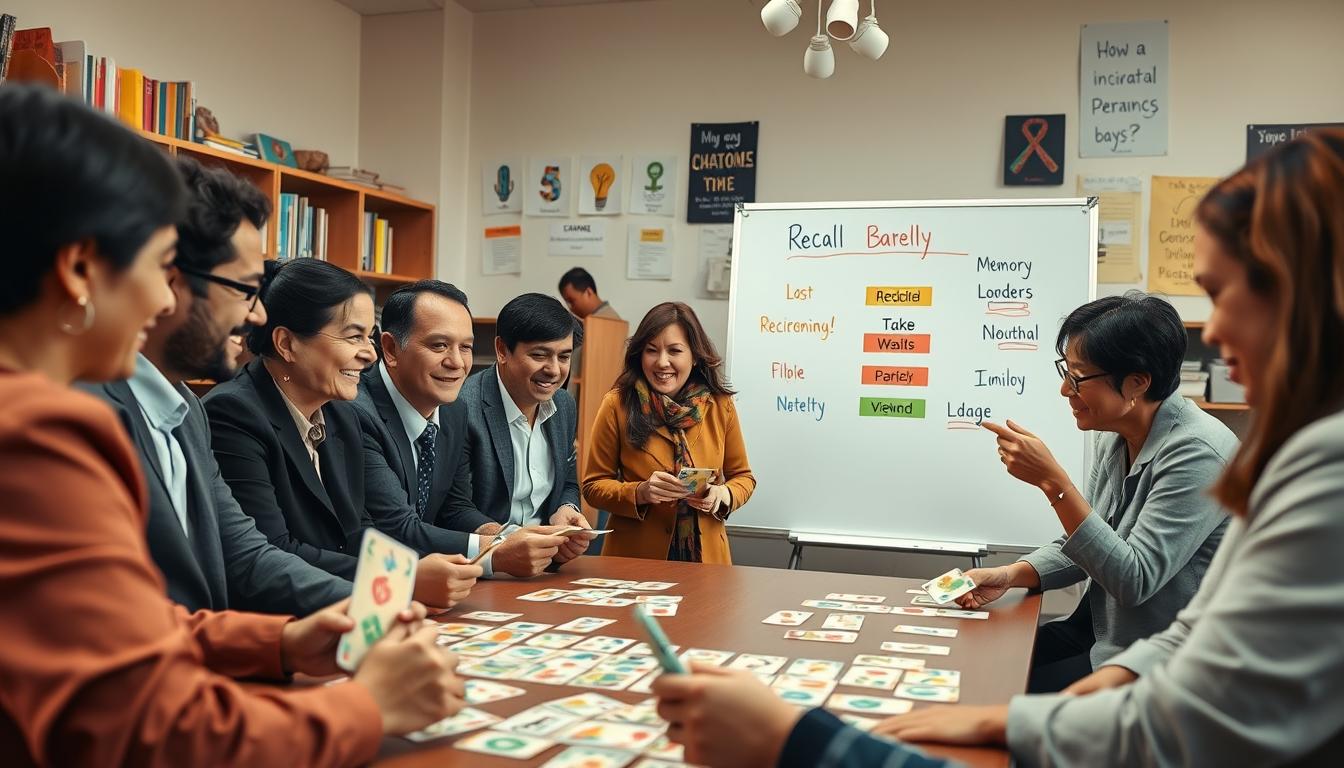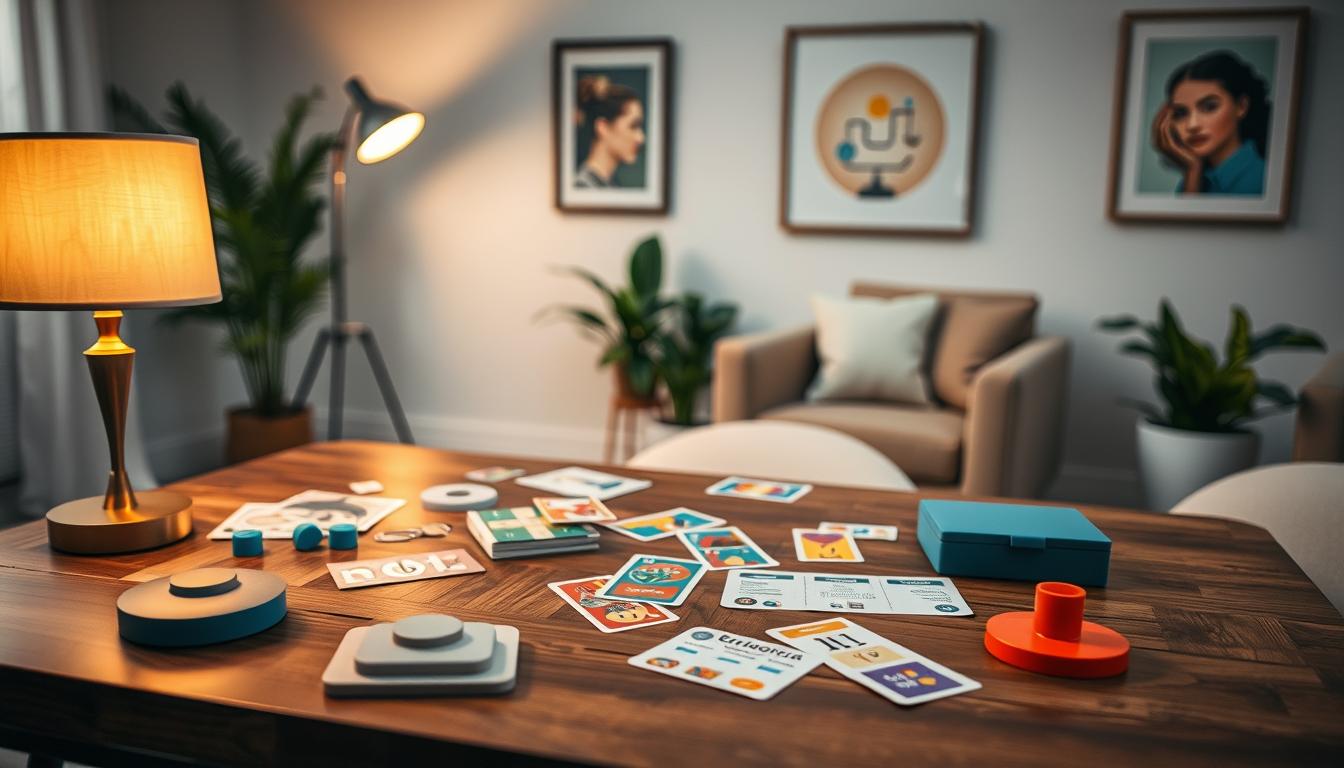Games that train the brain to retain information during long activities
Imagine making your memory better and sharpening your brain while playing games. In today’s world, keeping information in mind is key. That’s why working memory games are great for keeping your brain active and improving focus during long tasks.
This article will explore why brain training is important. We’ll look at different games and how they can boost your brainpower.
Introduction to Brain Training Games
Brain training games are becoming popular for improving our minds. They come in many forms, like apps and board games. These games challenge our brains, helping us think better and solve problems.
Ads for these games often promise big benefits. But, research shows a more detailed picture. Some games might boost memory or focus right away. But, how long these benefits last can vary a lot.
It’s important to know what mental exercises are out there. This way, we can pick the best games for our goals. By choosing wisely, we can improve our brain health in a meaningful way.

The Importance of Retaining Information
Keeping information in mind is key in our daily lives. It helps us navigate both our personal and work lives. Good memory is crucial for solving problems and learning new things.
In today’s world, we face a lot of data. Being able to pick out and remember important info is vital. This skill is not just for school but also for work.
Understanding how we process information helps us learn better. Improving our memory boosts our confidence and success. Making memory a priority can also improve our overall brain health and daily life.

Understanding Working Memory
Working memory is key to how we handle information every day. It acts as a mental space where we can hold and work with information for a short time. Unlike short-term memory, which just stores info briefly, working memory helps us do tasks, make choices, and solve problems.
Definition of Working Memory
Working memory is the system that keeps and processes info as we need it. It’s crucial for thinking, learning, and doing tasks that need active thinking. It lets us focus on tasks and mix new info with what we already know.
Role in Daily Activities
Working memory affects many daily tasks, like following directions, planning, and talking. For example, when someone shares a complex idea, working memory helps us keep track and understand it. This skill is important in school and work, where we need to make decisions based on lots of info.
| Aspect | Working Memory | Short-Term Memory |
|---|---|---|
| Duration | Temporary, for active processing | Brief, primarily storage |
| Function | Maintains and manipulates information | Stores information without manipulation |
| Involvement in Tasks | Critical for complex cognitive tasks | Useful for simple recall tasks |
| Capacity | Limited but can be expanded with practice | Limited, around 7 items |
Benefits of Brain Training Games
Brain training games offer many benefits, especially for improving cognitive skills. Playing these games regularly can greatly enhance your mental abilities. This makes you better at handling daily tasks.
Enhanced Cognitive Skills
Studies show that brain training games can significantly improve cognitive skills. These games work on different brain areas, like attention, memory, and problem-solving. This leads to better mental agility, helping you process information faster and tackle challenges more effectively.
Improved Focus and Concentration
Adding brain training games to your daily routine can boost focus and concentration. These games require your full attention and mental effort. This helps you stay focused and productive, whether at work or at home.
Types of Games that Engage the Brain
Playing different types of brain games can really boost your brain power. These games target various skills, offering challenges that help in many ways. Here are some key categories of games that can improve your mental abilities:
- Puzzles – Games like Sudoku and crossword puzzles help with solving problems and thinking logically.
- Strategy Games – Chess and checkers require planning ahead, improving your strategic thinking.
- Memory Games – Activities like matching pairs boost your memory and ability to recall information.
- Action Games – Quick video games sharpen your reaction time and hand-eye coordination.
- Word Games – Games like Scrabble enhance your vocabulary and quick thinking.
Each type of brain game offers unique mental challenges. By making these games a part of your daily life, you can improve your brain functions. It’s all about finding games that match your interests and skills.
Working Memory Games for Adults
Playing working memory games for adults can really boost your brain power. These games are fun and help improve your focus and mental sharpness. They’re not just good for your brain; they’re also a great way to have fun.
There are many games and apps out there to choose from. You can pick the ones that you enjoy the most. This makes brain training a fun and personal experience.
Examples of Effective Games
“Lumosity” is a well-known app that offers mental challenges tailored to your level. Games like “Memory” and “Uno” are also great. They help you remember things and think strategically.
Other games are made to help you remember better and think faster. They’re perfect for anyone looking to improve their brain skills.
Benefits of Regular Use
Playing these games regularly has many benefits. It helps you pay attention better and organize your thoughts. You’ll also notice your memory getting stronger.
These games are also great for reducing stress. They help you relax while making your brain sharper. You’ll find yourself doing daily tasks more efficiently.
| Game Title | Type | Benefits |
|---|---|---|
| Lumosity | App | Personalized cognitive challenges |
| Memory | Card Game | Stimulates memory recall |
| Brain Age | Video Game | Improves processing speed |
| Dual N-Back | App | Enhances working memory |
Physical Exercise and Brain Health
Physical exercise is key to better brain health and thinking skills. It boosts blood flow to the brain, feeds neural connections, and lowers the risk of brain decline. This mix of physical activity and mental sharpness is essential for top brain performance.
Impact of Physical Activity on Cognition
Studies prove that adding physical activity to your day boosts brain function. It improves memory, focus, and problem-solving. As you move, your brain gets the blood flow it needs to work best.
Combining Mental and Physical Challenges
Mixing mental and physical challenges is best for your brain. Activities like dancing, team sports, or yoga work both your body and mind. They offer physical benefits and boost brain health, leading to a healthier, sharper mind.
Cross-Training for a Healthier Brain
Brain cross-training makes your mind more agile. It involves doing different activities to improve your mental flexibility. This is key for handling life’s challenges.
Trying out various brain exercises can be very beneficial. Learning a new language, solving puzzles, and playing strategy games are great examples. They work different parts of your brain and keep your thinking sharp.
Adding physical exercise to your routine can also boost brain health. This mix of physical and mental activities leads to a healthier lifestyle. It focuses on both your mind and body.
Cognitive Activities Beyond Digital Games
Engaging the brain through non-digital activities is key to improving cognitive skills. Traditional methods boost thinking and creativity. They offer a break from digital distractions.
Books and Non-Computer-Based Games
Reading books can greatly improve your mind and memory. Whether it’s fiction or non-fiction, it opens up new ideas. Chess and board games also help with problem-solving and strategy.
Listening to Educational Podcasts
Podcasts are a great way to learn and grow. They cover many topics and improve listening skills. Educational podcasts make learning fun and engaging.
Recommended Brain Training Activities
Doing brain training activities can really help improve your thinking skills. This part talks about how puzzles and games can make your brain work better. Adding these to your daily life can make you smarter and more strategic.
Puzzles and Strategy Games
Puzzles are great for making your mind sharper. They make you think deeply and solve tough problems. Games like chess need you to plan and adjust as things change. These games boost memory and help you make better choices.
Card Games and Their Cognitive Benefits
Card games are awesome for growing your brain. They need you to count, think strategically, and make fast choices. Playing cards can sharpen your focus and quick thinking. It’s a fun way to get better at thinking and enjoy time with friends.
Creating a Balanced Brain Training Routine
Creating a brain training routine is key for keeping your mind sharp. It should include a mix of digital games and old-school exercises. This mix keeps your brain active and challenges it in different ways.
To get your mind growing, try these exercises:
- Puzzles that boost problem-solving skills.
- Memory games that enhance recall abilities.
- Strategy-based board games that encourage critical thinking.
- Physical activities that require mental engagement, such as dance or sports.
Adding these to your routine can improve focus and memory. It also makes your brain more resilient. A balanced routine is the best way to grow your mind.
Research and Evidence on Brain Training Games
Research shows a complex link between brain training games and cognitive benefits. Studies suggest these games can improve memory and attention in the short term. But, it’s crucial to remember that not all games are created equal.
Experts say that playing a variety of games is key. Relying too much on digital games might not lead to lasting cognitive gains. It’s important to mix up the types of challenges you face.
Recent studies have mixed results, showing the need for a balanced approach. Instead of focusing on just one type of game, it’s better to try different ones. As research continues, we’ll learn more about how to truly improve our minds through games.
How to Choose the Right Brain Training Game
Choosing brain games needs careful thought about what you want to improve and what you enjoy. Knowing what you like makes training more fun and effective. It’s important to look at different types of games and what they offer.
When picking a game, think about how it tests your memory, attention, and problem-solving. Games that offer a variety of challenges are best for improving your mind. Also, check out what others say about the game to see if it’s worth it.
It’s important to pick a game that you find fun. If you enjoy playing, you’ll keep at it. Games that are both fun and mentally stimulating are the best for brain training.
| Criteria for Brain Training | Game Type | Focus Area |
|---|---|---|
| Memory Challenges | Card Matching | Short-Term Memory |
| Problem-Solving | Puzzle Games | Critical Thinking |
| Attention | Reaction Time Games | Sustained Attention |
| Strategy | Chess | Strategic Thinking |
| Speed | Fast-Paced Games | Processing Speed |
Social Interaction and Cognitive Health
Being social is key to keeping our minds sharp. It makes us feel connected and keeps us active. Studies show that being part of a community is good for our brains.
Importance of Community Engagement
Being in a community has many benefits for our minds. It helps us talk, share, and learn from others. This keeps our brains active and can prevent memory loss.
Going to community events helps us make friends and learn new things. It keeps us engaged and happy.
Games as a Social Activity
Playing games with others is more than fun; it’s good for our brains. It makes us think and work together. This improves our problem-solving skills.
Playing games with loved ones brings joy and strengthens our bonds. It’s great for our mood and keeps our minds sharp.
Maintaining a Healthy Brain Through Lifestyle Choices
Creating a lifestyle that supports brain health is key for better thinking and feeling good. What we eat and how much we sleep greatly affect our brain’s performance. Eating right and getting enough rest are crucial for a healthy brain.
The Role of Diet and Nutrition
A balanced diet is vital for a healthy brain. Foods packed with antioxidants, omega-3s, and vitamins are especially good. Eating a variety of fruits, veggies, and whole grains can make our brains work better. Here’s a table showing foods that are great for brain health:
| Food Group | Benefits |
|---|---|
| Fatty Fish | High in omega-3 fatty acids, supports neuronal function and cognitive performance. |
| Berries | Rich in antioxidants, helps reduce oxidative stress and inflammation. |
| Leafy Greens | Provide essential vitamins like K, E, and folate that support brain health. |
| Nuts and Seeds | Contain healthy fats and vitamin E, which may help protect against cognitive decline. |
Importance of Regular Sleep
Good sleep is essential for our brains to work well and remember things. Sleep helps remove brain toxins and fixes damaged brain cells. A regular sleep schedule and a comfy sleep space can improve sleep quality. Combining healthy eating with enough sleep keeps our brains sharp all day.
Conclusion
Brain training games are a great way to boost your brain power and memory. These games, especially those that focus on working memory, can make your mind healthier and more agile. They help you grow personally and learn more about how your brain works.
Adding both digital and old-school games to your daily life is key. Eating right, exercising, and getting enough sleep also help. This mix keeps your brain sharp as you get older.
Brain training can be fun and easy to fit into your life. Try puzzles, strategy games, or join in on community activities. Doing so makes your mind stronger and opens up new ways to think. Start now and see how your brain can improve.
FAQ
What are brain training games?
Brain training games are activities that help improve your brain. They focus on memory and brain function. You can find them as apps or in tabletop games.
How do working memory games help cognitive function?
Working memory games challenge your brain. They improve skills like attention and problem-solving. They help your brain handle information better.
Can brain training games provide long-term benefits?
Short-term benefits are common with brain games. But, long-term gains might need more than just digital games. A mix of challenges is key.
What types of games engage the brain?
Many games engage the brain. Puzzles, strategy games, and memory challenges are good examples. Each type boosts different skills, making brain training well-rounded.
Are there any recommended brain training games for adults?
Yes, adults can benefit from “Lumosity” and traditional games like “Memory.” Card games also improve memory and speed.
How does physical exercise impact brain health?
Exercise boosts brain health by improving blood flow. It reduces cognitive decline risk and supports neural growth. Combining exercise with mental games is best.
What is brain cross-training?
Brain cross-training uses different mental skills. It strengthens neural connections and builds cognitive reserve. This makes your brain more resilient.
What are some cognitive activities besides digital games?
Good alternatives include reading, crossword puzzles, and board games. Educational podcasts also help. These activities improve critical thinking and problem-solving.
How can I create a balanced brain training routine?
Mix digital and non-digital activities for a balanced routine. This targets various cognitive areas. Diverse exercises ensure mental growth and avoid overtraining.
Why is social interaction important for cognitive health?
Social interaction boosts cognitive health. It provides mental stimulation and emotional support. Games and activities with others improve cognitive function and well-being.
How can diet and nutrition affect brain function?
A brain-healthy diet is essential. It should include antioxidants, omega-3s, and vitamins. A good diet supports cognitive functions and reduces memory risks.














